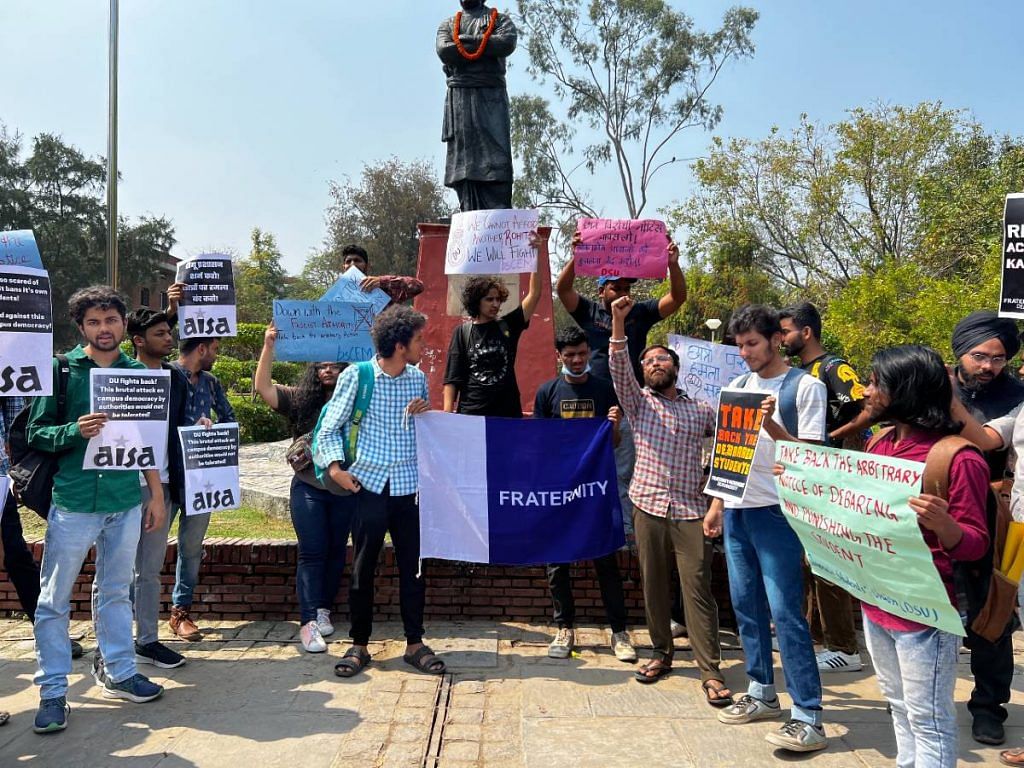New Delhi: Delhi University is facing mounting criticism over its move to bar two students from sitting examinations for a year over their alleged role in trying to organise a screening of the controversial BBC documentary on the 2002 Gujarat riots in January.
Students from the All India Students Association (AISA) and the Bhagat Singh Chatra Ekta Manch held a protest outside the university’s Faculty of Arts Wednesday afternoon and demanded that the administration rescind its order.
Congress leader Shashi Tharoor also commented Tuesday on the university’s move against one of the two students, Lokesh Chugh — a leader of the National Students’ Union of India, the Congress’s student wing. Tharoor tweeted that he was “appalled by this shocking decision”.
As a @Delhiuniversit alum committed to academic freedom & independence of thought, I am appalled by this shocking decision. To suspend a student for two years for watching a documentary in a democracy is a disgrace & a betrayal of everything a university should stand for. Shame! pic.twitter.com/cpwVLr9OQb
— Shashi Tharoor (@ShashiTharoor) March 21, 2023
In January, after the Union government used emergency powers to block the BBC documentary, titled India: The Modi Question, students at several public and private institutions across the country had screened it as a mark of protest against “censorship”.
Student groups at Delhi University, including the NSUI, had reportedly planned screenings of the documentary on 27 January. However — following scuffles and police action over screenings at other universities — Section 144 was imposed on campus and the Delhi Police detained 24 students for trying to screen the documentary.
After this, a seven member-committee comprising university officials and professors was formed to look into the incident. The action against the two students came on the back of the committee’s recommendations.
The two students are Chugh, a PhD scholar in the anthropology department, and Ravinder (last name not revealed) of the Faculty of Law. Speaking to ThePrint, Chugh — the state media coordinator for the NSUI — called the university’s action arbitrary and unfair, saying he was only present at the protest site to speak to the press.
AISA Delhi president Abhigyan (who goes by one name) said, “Students across the country, in a mark of protest, aired the BBC documentary and none of the institutions have reacted as severely as DU. The documentary was blocked by the Ministry of Electronics and Information Technology and not banned.”
However, a senior Delhi University official, who wished not to be named, told ThePrint that the two students were found in maximum violation of university norms, which is why the committee took the decision to bar them.
“It is a well thought-out decision which was taken after speaking to all students. Milder punishments have been awarded to six other students in accordance with their involvement,” the official added.
Ravinder, the second student barred for a year, is a member of another student organisation, the Bhagat Singh Chatra Ekta Manch. ThePrint tried to reach him over the telephone and by text, but he remained unavailable for comment.
While NSUI members said they tried to hold the screening on 27 January outside the campus, they claimed that the Bhagat Singh Chatra Ekta Manch had organised its own screening inside the campus.
Also read: ‘Book by Pakistani author being taught at AMU, Jamia?’ MP’s query condemned by 250 academics
‘Targeted because I was highest-ranking NSUI member’
A memorandum on the action against Chugh, dated 10 March and accessed by ThePrint, says, “On the basis of the recommendations of the seven-member committee the disciplinary authority taking cognisance of the above indiscipline exhibited by Shri Lokesh Chugh, decided to impose the penalty of debarring him from taking any university or college or departmental examination or examinations for one year.”
However, Chugh told ThePrint, “I did not participate in the protest. I even asked the university to check the CCTV footage to see if I was involved in the screening. I have been targeted simply because I was the highest ranking NSUI member present at the university. I went there briefly just to coordinate with the media present.”
“On 16 February, I was sent a memorandum asking me to be present before the seven-member committee that was looking into the screening violations on the campus. I presented my case in front of them too.”
He claimed that the university had rejected his PhD thesis, which he submitted on 14 March, and that he received the letter of debarment quoted above on 16 March.
Other screenings in January
The DU students’ bid to screen the documentary in January was one of several attemps at universities across the country.
As many as 13 students of Jamia Millia Islamia were detained after they attempted to screen the film, while there were scuffles between rival student groups at Jawaharlal Nehru University.
A dramatic battle of screenings took place at University of Hyderabad, too. When the Students’ Federation of India (SFI) — the Communist Party of India (Marxist)’s student wing — screened the documentary, the Rashtriya Swayamsevak Sangh-affiliated Akhil Bharatiya Vidyarthi Parishad (ABVP) started its own screenings of The Kashmir Files.
At Kolkata’s Jadavpur University, the screening was held peacefully. But on the same day, Pondicherry University students had to resort to watching the documentary on their phones and laptops after the electricity and Wi-Fi on campus were cut off.
(Edited by Richa Mishra)
Also Read: BBC documentary that has students protesting – What’s the nature of the ban?
